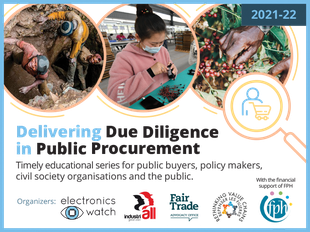Human Rights and Environmental Due Diligence – what have we learned so far?
Our educational series on human rights and environmental due diligence in public procurement is drawing large audiences from civil society, trade unions, policy makers, public administrations, and companies. 550 people signed up for the first three sessions where we addressed transparency, verification, and enforcement of effective due diligence. The series takes place in the context of pathbreaking new laws and proposals on due diligence, including the European Commission proposal for a directive on corporate sustainability due diligence.
Supply chain transparency has been a central theme in our series. Kristel Tonstad, who was the Head of the Secretariat of the Ethics Information Committee in Norway which drafted the Norwegian Transparency Act, explained that this law includes both the corporate duty to disclose adverse impact and the right to information. This right allows anyone to demand information from an enterprise about how it addresses risks generally but also with respect to specific products. This more focused transparency is especially important for public buyers, Kristin Tallbo, Sustainability Strategist at the Adda Central Purchasing Body in Sweden, explained. Public buyers are required to monitor the subject matter of the contract which means that “general statements from brands are not valuable to us,” she said. “We need to be able to follow the subject matter of procurement, the product itself, which means we need to know the factory address and we need the exact audit report for that factory.”
Workers’ vital role in due diligence has been another important theme. “Without trade unions you cannot implement due diligence,” explained Kan Matsuzaki, Assistant General Secretary of the IndustriALL Global Union. “We have 130 years of experience dealing with workers’ rights all over the world.” Kalpona Akter, Executive Director of the Bangladesh Center for Worker Solidarity, called for a workers’ voice in monitoring, “otherwise auditing doesn’t make any sense to us.” Glen Mpufane, Director of Mining at the IndustriALL Global Union, likewise noted that “workers’ voices are integral to the sustainability and due diligence conversations” and that worker involvement in the audit process without fear of recrimination is essential. Reflecting these concerns, one of the leaders in the legislative arena, Heidi Hautala, observed that “meaningful stakeholder engagement” is not yet sufficiently addressed in the proposed directive on corporate sustainability due diligence.
Ms. Hautala, who is Member of European Parliament and Chair of the Parliament working group on Responsible Business Conduct, signaled that the current debate on due diligence could become “an important milestone on the way to global rules” for due diligence. These rules must of course be enforceable. Ms. Hautala highlighted the crucial element of civil liability in the proposed directive. Companies can be held liable for harm and victims can get compensation for damages resulting from the failure to comply with due diligence obligations, she explained. While enforceability and reparation for victims is an important building block of due diligence, it can only be realized with sufficient supply chain transparency and meaningful stakeholder engagement.
The next session, on the 24th of May, 14.00-15.30 Central European Summer Time, will address purchasing practices and due diligence, focusing on responsibilities for both private and public Buyers.
Register here.


